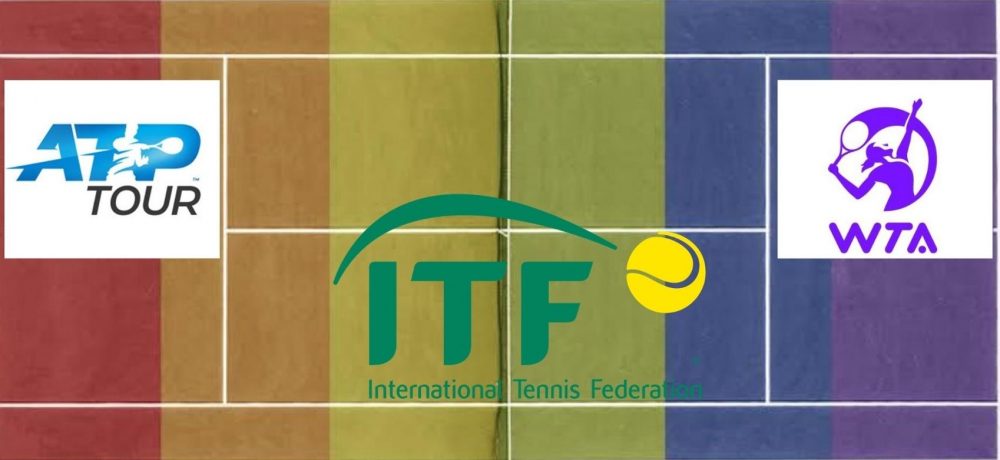Tennis has an illustrious reputation when it comes to LGBT representation compared to some other sports.
Billie Jean King, who was first outed by the media in 1981, played an instrumental role in the formation of the WTA Tour and the campaign for equal pay highlighted by her infamous Battle of the Sexes match against Bobby Riggs. It was also during 1981 when Martina Navratilova came out as gay for the first time. Despite being one of the sports biggest stars, the multiple Grand Slam champion admits that she lost endorsement deals due to her sexuality. Nowadays the treatment and promotion of LGBT players have improved for the better, but does more need to be done?
In recent years tennis has dabbled in and out of the Rainbow Laces campaign with the British Lawn Tennis Association throwing their weight behind it. The initiative was created by LGBT charity Stonewall and initially marketed specifically towards football’s Premier League. The idea is to get players to wear rainbow laces in order to raise awareness of LGBT representation within sport. As for its effectiveness in combating homophobia, it is debatable.
“In the UK, sports teams have also been holding Rainbow Laces for the past seven years, yet homophobic language also remains common. Two-thirds of teenage football players and nearly half of male rugby players admit to recently using homophobic language with teammates (for example, fag), which is generally part of their banter and humour. At the amateur level, gay and bisexual males remain invisible,” Erik Denison from Monash’s Behavioural Sciences Research Laboratory wrote in a 2020 report.
“However, recent research suggests that refocusing the current Rainbow Laces campaign, which is underway, away from professional teams and strongly towards amateur sport settings could help fix these problems. We also need to change the education that is being delivered.”
It is important to take Denison’s conclusion with a pinch of salt as his assessment focused solely on team sports and not tennis. Inevitably, some of his findings might be also applicable to tennis, but it is unclear as to what extent.
If the rainbow laces approach does help the LGBT community to some degree and therefore any potential closeted player, should tennis bosses do more to promote it? UbiTennis has approached three governing bodies to generate their view with all of them saying they would be in favour of allowing players to participate.
“The work Premier League and Stonewall are doing to drive awareness around LGBT inclusion sets a great example, and we would absolutely support any ATP player that wishes to support such an initiative, or personally express themselves,” an ATP Spokesman told UbiTennis.
“We believe that tennis has an important role to play in promoting inclusivity in sport, and across wider society, and earlier this year Tennis United served as a platform for ATP to amplify voices around this important topic. The ATP has directed efforts for positive change across many causes via the ATP Aces For Charity programme, and we are currently reviewing our overall approach in this space.”
Unlike their female counterparts, there is currently no openly LGBT player on the ATP Tour and few historically. Bill Tilden, who won 10 Grand Slam titles throughout the 1920s, struggled with his sexuality during a time where gay sex was illegal and not accepted by society. More recently, America’s Brian Vahaly was a former top 100 player during the early 2000s, but chose to come out after retiring from the sport.
The WTA points out that they have been working with the ATP last season and addressed LGBT topics during their ‘Tennis United’ chat shows which was broadcast online.
“The WTA was founded on the principles of equality and opportunity, along with positivity and progress, and wholeheartedly supports and encourages players, staff, partners and fans’ commitment to LGBT+ initiatives,” a statement reads.
“The WTA supports tournament and Grand Slam LGBT+ projects both logistically and financially, amplifies our athletes’ voices on this topic through the Tour’s global platforms, and increased awareness by incorporating the LGBT+ spirit into our corporate identity in June across our digital platforms.
“Despite the challenges 2020 has presented, this year saw the WTA mark Pride month with a series of podcasts and web articles, interview guests on the WTA & ATP digital show Tennis United from the LGBT+ community, and through WTA Charities collaboration with You Can Play, offer equipment and financial donations and players participate in a virtual panel discussion.”
The International Tennis Federation is responsible for overseeing the running of the junior Tour, Davis Cup, Billie Jean King Cup (previously known as Fed Cup) and the Olympic Tennis tournament. A spokesperson said they would endorse any campaign which would support an equal playing field in the sport. Making reference to their Advantage All campaign which aims to ‘develop and maintain tennis as an equal advantage sport.’
“Tennis has a proud history of its athletes being at the forefront as advocates of positive social change, using their voice and platforms to raise awareness. We would be supportive of initiatives that reinforce the positive message that tennis is an equal advantage sport which is open to all,” UbiTennis was told.

Leave a comment





